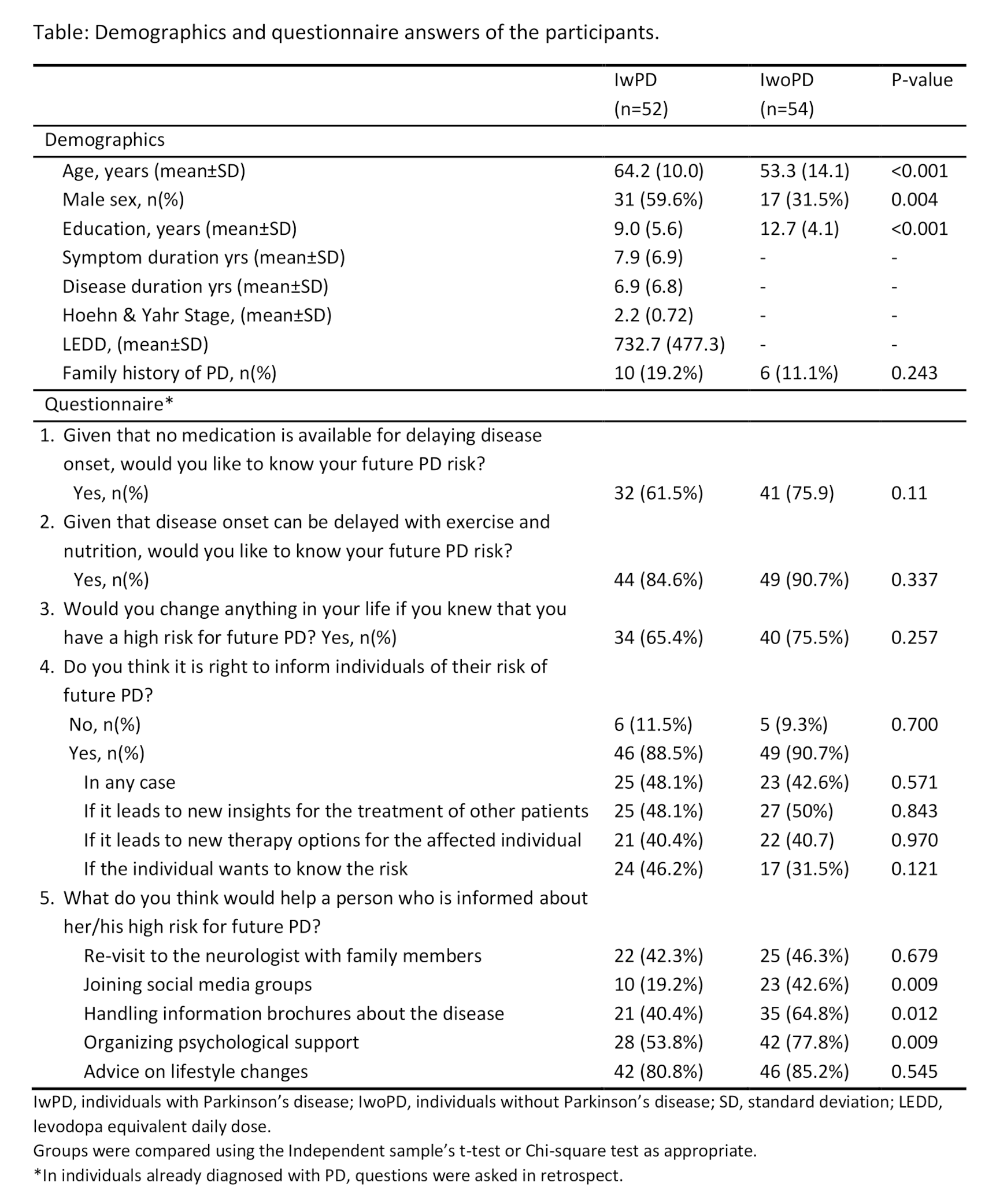Objective: To investigate the attitudes of individuals with and without Parkinson’s disease (IwPD, IwoPD) relevant to risk disclosure for future PD in Turkish culture.
Background: In the last decade, much has been accomplished in elucidating the prodromal stage of PD [1]. However, for individuals assumed to have prodromal PD, ethical aspects and cultural differences in risk disclosure for future PD are yet to be understood. One study from Germany reported that 46% of the IwPD would have liked to know their future risk before the diagnosis [2]. Nonetheless, this rate increased to 85% if they had known the potential impact of lifestyle changes on disease progression.
Method: The German questionnaire was adapted to Turkish and was given retrospectively to IwPD and prospectively to IwoPD in Turkey to evaluate their approach for being informed about their risk for future PD. The questionnaire also included questions about the challenges and psychological burden during the diagnostic period for IwPD.
Results: Demographics and questionnaire answers of the groups are given in the Table. The group of IwoPD (n=54) was younger, more educated, and had a lower male sex ratio compared to IwPD. Out of 52 with IwPD, 24 (46.2%) reported that the period between the symptom onset and diagnosis was troublesome. Twelve (23.1%) received false diagnoses, nine (17.3%) of whom were treated or even operated. The results showed that 61.5% of the IwPD and 75.9% of the IwoPD wanted to know their diagnosis beforehand (p=0.11). Moreover, McNemar’s test showed that with the recognition of the potential impact of lifestyle changes, favoring early risk disclosure increased by 23.1% (p=0.002) and 14.8% (p=0.008) in IwPD and IwoPD groups, respectively. Also, both groups strongly supported the option that individuals should be informed of their future PD risk.
Conclusion: The results show that the attitudes of Turkish people towards risk disclosure are similar to those in Western culture. The majority of the participants with and without PD agreed that individuals at risk for future PD should be informed of their risk, especially when the influences of the lifestyle factors are considered. Risk disclosure of future PD may encourage early lifestyle changes and reduce the burden of late or misdiagnosis in individuals with prodromal PD.
References: 1. Postuma RB, Berg D. Advances in markers of prodromal Parkinson disease. Nat Rev Neurol, 2016 Oct 27;12(11):622-634. 2. Schaeffer E, Rogge A, Nieding K, Helmker V, Letsch C, Hauptmann B, Berg D. Patients’ views on the ethical challenges of early PD detection. Neurology, May 12, 2020; 94 (19).
To cite this abstract in AMA style:
G. Kayis, R. Yilmaz, G. Yalcin-Cakmakli, B. Arda, B. Elibol, MC. Akbostanci. Attitudes towards risk disclosure in prodromal Parkinson’s disease. Is there a cultural difference? [abstract]. Mov Disord. 2021; 36 (suppl 1). https://www.mdsabstracts.org/abstract/attitudes-towards-risk-disclosure-in-prodromal-parkinsons-disease-is-there-a-cultural-difference/. Accessed January 1, 2026.« Back to MDS Virtual Congress 2021
MDS Abstracts - https://www.mdsabstracts.org/abstract/attitudes-towards-risk-disclosure-in-prodromal-parkinsons-disease-is-there-a-cultural-difference/

